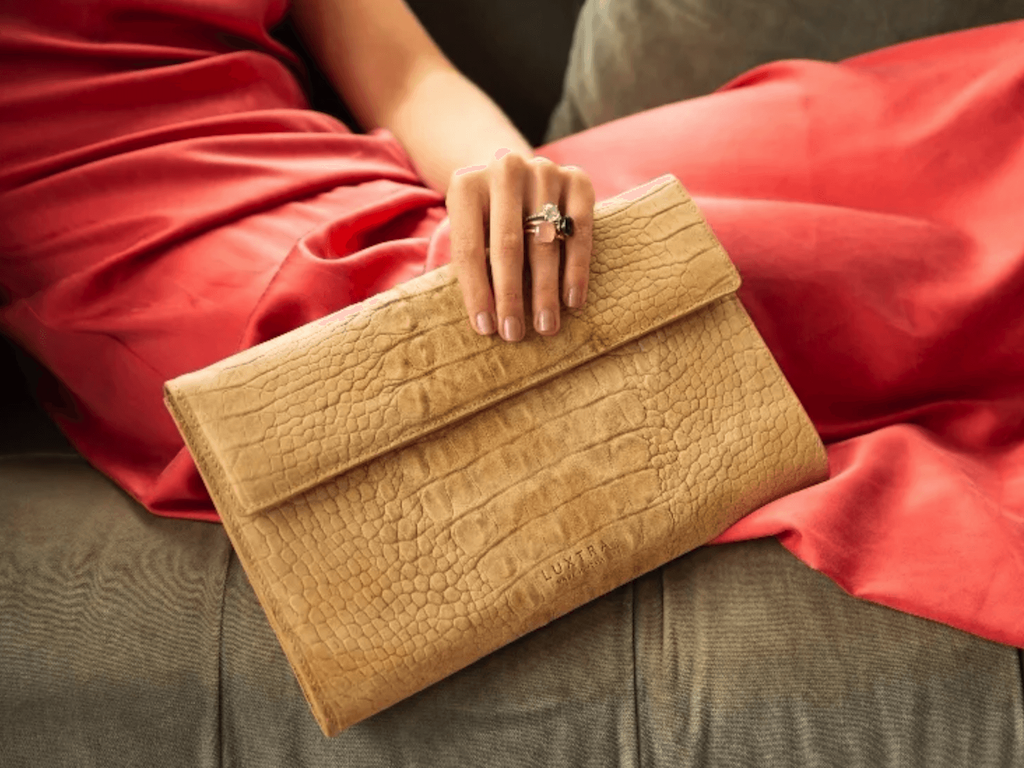3 Mins Read
Mango-based leather will be used in Luxtra’s new collection of cruelty-free and vegan-friendly handbags. Created in collaboration with Dutch company FruitLeather Rotterdam, the leather-like material is derived from leftover mangoes sourced from fruit markets that would otherwise be thrown away as waste. As consumer demand for more sustainable alternatives continues to grow, more fashion brands are beginning to incorporate food waste into their eco-friendly designs.
London-based sustainable brand Luxtra will debut their collection of vegan leather handbags in late March this year. In partnership with Hugo De Boon and Koen Meerkerk of Dutch startup FruitLeather Rotterdam, Luxtra will be one of the first brands to create handbags out of a durable, leather-like material made from leftover mangos sourced from fruit markets. FruitLeather Rotterdam creates the mango leather fabric by mashing and boiling mangoes, which eliminates the bacteria, and then spreads the mashed fruit out in sheets to dry.
Compared to conventional leather, mango-based leather is not only more ethical as it does not involve animal cruelty, but it also requires far fewer resources to manufacture. Livestock raised to create leather has been associated with a number of environmental harms, from contributing to further deforestation for cattle ranching to water and land overuse as well as greenhouse gas emissions. Leather processing additionally involves tanning animal hides to prevent decomposition, with over 90% of production using chromium tannings that contain carcinogenic gases and heavy metals that often flows into and contaminates waterways.
Using leftover mangoes therefore helps to reduce food waste, minimise the environmental footprint of material and textile production, and also eliminates the animal welfare concerns associated with animal-derived fabrics such as leather.
This is not the first time Luxtra has incorporated food waste materials into their sustainable fashion designs. Previous collections have featured Piñatex, a vegan leather made from pineapples, and another vegan leather made from apples called Frumat.
Other brands have also joined the latest trend of using food waste to create more sustainable and cruelty-free fashion items in response to increasingly eco-conscious consumers. For example, Swedish fast fashion behemoth H&M has recently used Vegea, made from the byproducts of wine to create handbags and shoes in its upcoming Conscious Collection. The collection will also feature a more eco-friendly dyeing process involving waste coffee grounds, as well as a dress made from Circulose, which is woven from recycled waste denim.
Creative uses for recycling food waste isn’t just happening in the fashion industry. In the Philippines, a team of designers have come up with Pinyapel, a specialty biodegradable and treeless paper made from discarded pineapple leaves, which can be used to make a number of products such as coffee cups and paper shopping bags.
Another scientist also in the Philippines has come up with a new blend of water soluble bioplastic to fight both the issue of plastic pollution and food waste. Last year, Denxybel Montinola developed a mango peel and seaweed based plastic, both of which are locally abundant ingredients. His proprietary bioplastic can be used for food packaging products and in medicinal applications such as scaffolding to stop localised bleeding.
Lead image courtesy of Luxtra.




